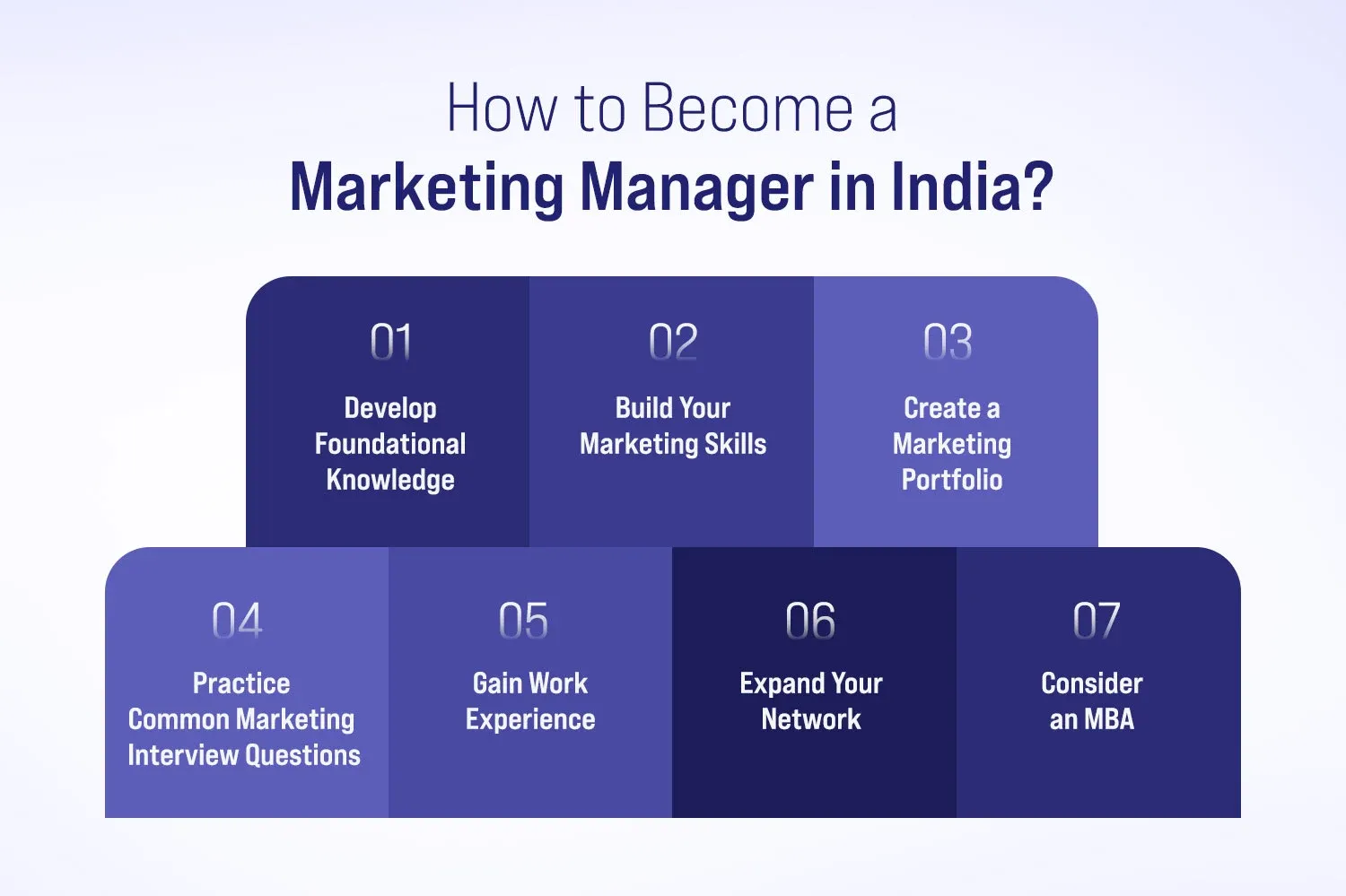How to Become a Marketing Manager?

In today’s fast-paced and highly competitive market, companies rely heavily on strong marketing strategies to stay ahead—and at the center of those strategies is the marketing manager. Whether it’s launching new products, building brand awareness, or analyzing market trends, marketing managers play a critical role in driving business growth.
If you're aiming to break into this fast-paced role, knowing the roadmap to success is crucial. This article will guide you through who a marketing manager is, how to become one in India, the essential skills you need, responsibilities of the role, salary expectations, and much more.
Who Is a Marketing Manager?
A marketing manager is a key professional responsible for shaping the public image and market presence of a brand, product, or service. They design, implement, and evaluate marketing strategies that not only enhance brand visibility but also drive customer engagement and sales. By analyzing market shifts, customer preferences, and company goals, marketing managers serve as the vital link between a brand and its audience.
How to Become a Marketing Manager in India?
Becoming a marketing manager is a journey that involves continuous learning, hands-on experience, and the development of both technical and soft skills. Here’s a step-by-step breakdown of how to pursue this career path in India:

Develop Foundational Knowledge
The first step toward becoming a marketing manager is acquiring a relevant academic background. Most hiring managers look for candidates holding at least an undergraduate degree in marketing, business management, or similar disciplines. These courses cover core concepts like consumer insights, branding, market analysis, and strategic communication.
Courses in these disciplines help build a theoretical framework, which is essential to understand how markets function and how businesses craft their outreach strategies. This foundational education acts as the cornerstone for developing strategic marketing insight.
Build Your Marketing Skills
Excelling in marketing demands a balance of digital skills and interpersonal abilities. Marketing managers must master skills such as SEO, social media marketing, analytics tools (like Google Analytics), and CRM systems. At the same time, they should nurture leadership, creativity, and communication abilities.
Consider certifications in tools and platforms such as Google Ads, HubSpot, or Meta Business Suite to gain practical expertise and boost your employability. Skill-building is a continuous process and forms the backbone of your career growth in the marketing field.
Create a Marketing Portfolio
A well-documented portfolio showcasing marketing campaigns, data analysis reports, content strategies, and other relevant projects serves as compelling proof of your capabilities. Include case studies, project outcomes, sample campaigns, and measurable results from internships or freelance work.
Your portfolio becomes a crucial tool during interviews and job applications, allowing you to stand out in a competitive market. Whether it’s a social media campaign or a branding exercise, demonstrating how your ideas led to real-world impact can set you apart from other candidates.
Practice Common Marketing Interview Questions
Being prepared for interviews can set you apart from other candidates. Familiarize yourself with commonly asked interview questions for a marketing manager role. This includes questions that test both your marketing knowledge and problem-solving capabilities, such as scenario-based questions, branding strategy assessments, and campaign improvement suggestions.
Practicing these questions not only boosts your confidence but also helps you clearly articulate your strategic thinking and problem-solving abilities. With better preparation, you increase your chances of securing the right job opportunity and progressing faster.
Gain Work Experience
Nothing substitutes the value of hands-on industry experience. Begin internships, freelance gigs, and part-time roles, as they can help you build a strong understanding of audience behavior, market positioning, and competitor analysis.
Exposure to different aspects of marketing operations like campaign planning, customer engagement, and data analysis will build your versatility and deepen your understanding of the role. This phase allows you to learn on the job and slowly build a professional reputation within the industry.
Expand Your Network
Building connections unlocks career growth and guidance. Participating in seminars, marketing summits, and networking events keeps you informed and introduces you to industry leaders.
Networking doesn’t just reveal job openings—it can also foster mentorships and collaborations that propel your professional journey. A robust network serves as both a career lifeline and a launchpad for advancement.
Consider an MBA
A master’s degree can dramatically enhance your job opportunities. While not always mandatory, an MBA, especially one focused on marketing, can significantly enhance your career prospects.
It offers exposure to strategic-level thinking, leadership training, and access to better-paying roles while equipping you with advanced skills in strategic thinking, consumer psychology, market forecasting, and leadership. For professionals seeking flexibility, alternative online MBA programs and certifications can provide similar benefits without full-time commitment.
Skill Requirements for a Marketing Manager
To succeed as a marketing manager, it’s not just technical knowledge that counts—what truly sets top-performing professionals apart is their ability to apply a blend of hard and soft skills to real-world challenges. Below are five essential skills every aspiring marketing manager should master:
Communication
Marketing managers must be able to craft messages that resonate with target audiences across various platforms, like social media campaigns, a product launch email, or a brand story for a website. Internally, they must also collaborate seamlessly with diverse teams, such as sales, creative design, and product innovation.
This includes giving clear briefs, presenting strategies to leadership, and aligning the marketing vision across departments. Your ability to communicate, both speaking and writing, should be clear, convincing, and flexible enough to resonate with various stakeholders.
Budgeting
Marketing managers are often responsible for managing sizable budgets and ensuring every rupee spent contributes to ROI. This not just calls for financial literacy but also the skill to distribute budgets wisely across initiatives, platforms, tools, and assets.
They must track expenditures closely, measure the effectiveness of campaigns, and justify marketing spend with data-driven insights. Strong budgeting skills help avoid overspending and ensure optimal results from limited resources—especially crucial in startups and mid-sized businesses.
Negotiation
From negotiating ad rates and influencer contracts to collaborating with endorsers and agencies, negotiation is a daily part of a marketing manager’s role. Successful marketers know how to find common ground that benefits their company while maintaining positive relationships with partners.
This skill also comes into play when dealing with internal stakeholders in terms of negotiating timelines with the product team or securing additional budget from leadership. Being assertive yet tactful is key to achieving the best outcomes without compromising on professionalism or relationships.
Planning and Execution
Strategic planning and flawless execution are what transform concepts into high-impact campaigns. A marketing manager must be able to develop detailed marketing plans, set realistic timelines, allocate tasks, and monitor performance throughout the lifecycle of a campaign.
Execution involves keeping everything from coordinating with creative teams to launching initiatives across multiple platforms and adapting on the fly if something doesn’t go as expected to stay on track. Precision, organization, and follow-through are critical to ensuring all pieces come together smoothly.
Adaptability
The marketing landscape is constantly evolving, especially with the rise of digital platforms, changing consumer behavior, and emerging technologies. Marketing managers need to stay agile and open to changes like shifting strategies mid-campaign or learning new tools to stay competitive.
Adaptability also means being receptive to feedback, ready to pivot in response to analytics, and open to experimenting with new approaches. Those who adapt to change rather than resist it are more likely to steer innovative, high-performing marketing teams.
Marketing Manager Responsibilities
While specific responsibilities may vary, the core duties of a marketing manager typically revolve around leading initiatives that drive brand awareness, customer engagement, and revenue growth.
Conducting Market Research
One of the foundational responsibilities of a marketing manager is understanding the market landscape. This involves continuously analyzing consumer behavior, identifying emerging trends, and studying competitor strategies.
Marketing managers rely on data-gathering tools and analytics platforms to uncover insights that inform their marketing plans. Through in-depth research, they ensure that campaigns are relevant, targeted, and timely.
Cross-Departmental Collaboration
Marketing doesn’t operate in isolation and touches nearly every function within a company. Marketing managers must work in sync with departments like sales, product development, and customer support to maintain cohesive branding and messaging.
They also spearhead team meetings, establish collective goals, and synchronize marketing strategies with broader business objectives. Effective coordination across departments is essential to execute campaigns smoothly and measure their real impact.
Overseeing Digital Marketing and Social Media
In today’s digital-first world, a large part of a marketing manager’s job is focused on online channels. This includes planning and supervising content for social media platforms, managing paid ad campaigns (such as Google Ads or social media ads), implementing SEO strategies, and orchestrating email marketing workflows.
They track performance data, refine campaigns for better results, and ensure brand uniformity across all digital channels.
Staying Ahead of Trends
The marketing industry is in constant flux. New technologies, platforms, and tactics arise frequently, and consumer tastes evolve just as fast. Marketing leaders must stay ahead of trends and innovations to keep their approaches relevant and effective.
This could involve attending webinars, marketing conferences, or subscribing to industry publications. A forward-thinking marketing manager is always learning, testing new ideas, and pushing for innovation.
Planning Campaign and Execution
From product launches to seasonal promotions, marketing managers are responsible for end-to-end campaign management. This starts with defining campaign objectives and target audiences, followed by developing creative assets, setting timelines, assigning tasks, and launching the campaign across selected platforms.
They continuously monitor progress, tweak strategies when necessary, and evaluate campaign success through performance metrics like ROI, reach, and conversion rates.
Mentoring and Team Leadership
As leaders, marketing managers are often responsible for managing a team of marketing professionals, including copywriters, designers, analysts, and digital marketers. They provide mentorship, delegate tasks, set performance benchmarks, and help nurture talent within the team. Strong leadership ensures cohesive execution, boosts morale, and encourages innovation.
Types of Marketing Managers
There are many different types of marketing managers, each specializing in a specific area of marketing. Here are some of the most common types:
- Brand Manager: Responsible for developing and maintaining a brand's image and ensuring consistency across all marketing efforts.
- Product Marketing Manager: Specializes in promoting a particular product or line, handling positioning, messaging, and rollout plans.
- Content Marketing Manager: Focuses on crafting and sharing compelling content to engage and grow a target audience.
- Social Media Marketing Manager: Oversees a company’s social platforms, designs content strategies, and interacts with the community.
- Digital Marketing Manager: Leads a brand’s digital strategy, managing everything from search engine optimization and social media to email campaigns and online advertisements.
- Growth Marketing Manager: Uses data-driven strategies to rapidly grow a business, often in startup or tech environments.
The specific types of marketing managers a company employs will depend on its size, industry, and marketing goals. In smaller organizations, one marketing manager may handle multiple responsibilities, while larger companies often have specialized roles.
Marketing Manager Salary
On average, marketing managers in India earn around ₹1,200,000 per year, according to Glassdoor. That said, this number can vary greatly depending on your background, sector, employer scale, and where you’re based.

Key Factors That Shape Marketing Manager Salaries
- Company Size: The size of the business plays a big role. Larger, well-established firms typically offer higher salaries due to expensive budgets and more intricate marketing needs. Smaller firms may pay less but could provide more flexibility and faster growth paths.
- Industry Type: Your paycheck can also depend on the industry you work in. Sectors like tech, finance, and healthcare are known for paying more, particularly for digitally savvy marketing professionals. Specialized roles such as performance marketing or brand strategy can also command higher packages.
- Location: Where you're based—or where the company is headquartered—has an impact. Major urban centers like Bangalore, Mumbai, and Delhi usually provide better pay, matching the elevated living costs and concentration of leading corporations.
- Experience Level: As with most careers, earning potential in marketing management typically increases with experience. Freshers can expect an annual salary ranging from ₹3 to ₹5 lakhs, while mid-level professionals usually earn between ₹6 and ₹12 lakhs. Senior marketing managers, with significant experience, can command salaries of ₹10 to ₹20 lakhs or even more.
FAQs
Q1. Is marketing manager a hard job to get?
Ans: It can be competitive, but not impossible. Companies look for candidates with a mix of marketing experience, leadership skills, and industry knowledge. If you build a strong portfolio, stay updated on marketing trends, and gain relevant work experience, especially in digital marketing, landing a marketing manager role becomes much more achievable.
Q2. What is the qualification for a marketing manager?
Ans: Typically, a bachelor’s degree in marketing, business, communications, or a related field is the basic qualification. Yet, companies also prioritize practical experience, certifications in digital marketing platforms, and a proven history of successful campaigns. Sharp analytical and communication skills are non-negotiable.
Q3. Do you need an MBA to be a marketing manager?
Ans: An MBA helps fast-track your journey into marketing manager roles by offering structured knowledge, industry exposure, and access to valuable professional networks that open doors to top opportunities.
However, it’s not the only path. Many professionals break into marketing manager roles by showcasing their experience, strategic thinking, communication skills, and ability to deliver results. If you have a solid track record and stay ahead of marketing trends, you can succeed in this role—even without an MBA.
Q4. How to become a marketing manager with no experience?
Ans: If you have no formal experience, start by learning marketing fundamentals through online courses and certifications. Build a portfolio by working on personal projects, volunteering for non-profits, or helping small businesses with their marketing.
Seek out internships or junior positions like marketing assistant or coordinator to build hands-on expertise. Demonstrating measurable impact and a proactive mindset can pave your way to a leadership position in the future.
Q5. How to become a marketing manager without a degree?
Ans: While a degree helps, focus on gaining strong practical skills in areas like digital marketing, content creation, analytics, and campaign management through online platforms.
Build a solid portfolio, take certifications, and get real-world experience via internships, freelance work, or startup roles. Demonstrating your results and leadership abilities can help you advance to a marketing manager role without a formal degree.
Summing Up
Becoming a marketing manager in India offers exciting opportunities for those passionate about driving business growth through strategic marketing. While an MBA can enhance your prospects, hands-on experience, continuous skill development, and staying ahead of market trends are equally important.
By building a strong portfolio, gaining practical experience, and adapting to changes in the industry, you can successfully pursue a marketing manager role and advance in your career. With the right mindset and dedication, becoming a marketing manager can become an achievable milestone on your professional journey.

